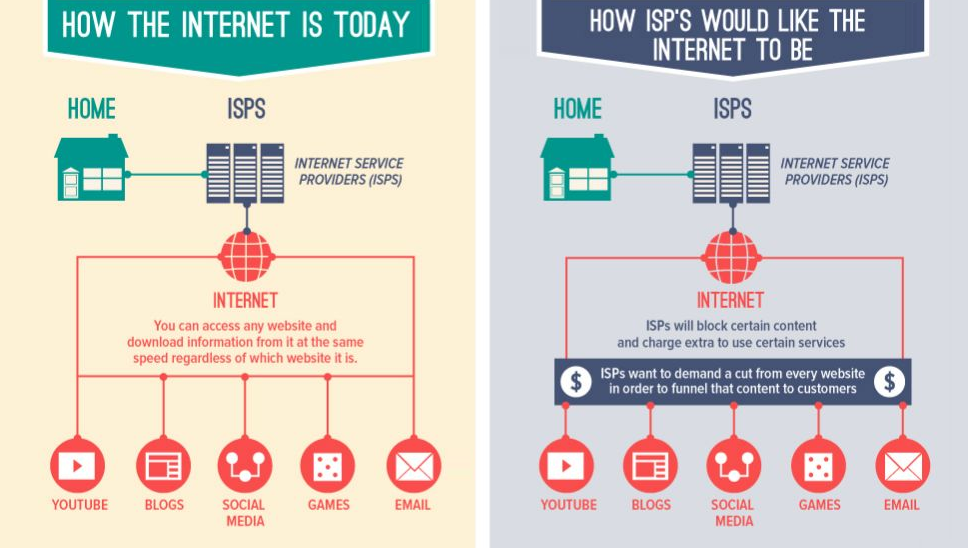Right...but where is a citation to the Net Neutrality bill that was passed? Do you really think that if the bill is not repealed the consumers will still be charged the same for their internet?
Edit: Of course Reddit is against this, as they would lose big $$$ if consumers stopped visiting their site in the same current volume. As of 2016 they were the 30th most trafficked site, but they probably rank higher in terms of shear volume of data being communicated to users. If 10% of their customers stop coming, then their INVESTORS are going to devalue their website. They will, just like Comcast and Charter/Spectrum, put misleading or biased information out there just to convince you to their side of the table. For what it's worth, I am FOR Net Neutrality, but there is much more to this bill than meets the eye.
http://transition.fcc.gov/Daily_Releases/Daily_Business/2015/db0312/FCC-15-24A1.pdf
All 400pgs in its beautiful glory..
3. Enhanced Transparency
23. The Commission’s 2010 transparency rule, upheld by the Verizon court, remains in full effect:
A person engaged in the provision of broadband Internet access service shall publicly disclose accurate information regarding the network management practices, performance, and commercial terms of its broadband Internet access services sufficient for consumers to make informed choices regarding use of such services and for content, application, service, and device providers to develop, market, and maintain Internet offerings.26
4. Scope of the Rules
27. In defining this service we make clear that we are responding to the Verizon court’s conclusion that broadband providers “furnish a service to edge providers” (and that this service was being treated as common carriage per se). As discussed further below, we make clear that broadband Internet access service encompasses this service to edge providers. Broadband providers sell retail customers the ability to go anywhere (lawful) on the Internet. Their representation that they will transport and deliver traffic to and from all or substantially all Internet endpoints includes the promise to transmit traffic to and from those Internet endpoints back to the user.
28. Interconnection. BIAS involves the exchange of traffic between a broadband Internet access provider and connecting networks. The representation to retail customers that they will be able to reach “all or substantially all Internet endpoints” necessarily includes the promise to make the interconnection arrangements necessary to allow that access.
29. As discussed below, we find that broadband Internet access service is a “telecommunications service” and subject to sections 201, 202, and 208 (along with key enforcement provisions). As a result, commercial arrangements for the exchange of traffic with a broadband Internet access provider are within the scope of Title II, and the Commission will be available to hear disputes raised under sections 201 and 202 on a case-by-case basis: an appropriate vehicle for enforcement where disputes are primarily over commercial terms and that involve some very large corporations, including companies like transit providers and Content Delivery Networks (CDNs), that act on behalf of smaller edge providers.
30. But this Order does not apply the open Internet rules to interconnection. Three factors are critical in informing this approach to interconnection. First, the nature of Internet traffic, driven by massive consumption of video, has challenged traditional arrangements—placing more emphasis on the use of CDNs or even direct connections between content providers (like Netflix or Google) and last-mile broadband providers. Second, it is clear that consumers have been subject to degradation resulting from commercial disagreements,28 perhaps most notably in a series of disputes between Netflix and large last-
mile broadband providers. But, third, the causes of past disruption and—just as importantly—the potential for future degradation through interconnection disputes—are reflected in very different narratives in the record.
31. While we have more than a decade’s worth of experience with last-mile practices, we lack a similar depth of background in the Internet traffic exchange context. Thus, we find that the best approach is to watch, learn, and act as required, but not intervene now, especially not with prescriptive rules. This Order—for the first time—provides authority to consider claims involving interconnection, a process that is sure to bring greater understanding to the Commission.
2. Broadband Providers Have the Incentive and Ability to Limit Openness
78. Broadband providers function as gatekeepers for both their end user customers who access the Internet, and for various transit providers, CDNs, and edge providers attempting to reach the broadband provider’s end-user subscribers.122 As discussed in more detail below, broadband providers (including mobile broadband providers) have the economic incentives and technical ability to engage in practices that pose a threat to Internet openness by harming other network providers, edge providers, and end users.
a. Economic Incentives and Ability
79. In the 2014 Open Internet NPRM, we sought to update the record with information about new and continuing incentives for broadband providers to limit Internet openness. As explained in detail in the Open Internet Order, broadband providers not only have the incentive and ability to limit openness, but they had done so in the past.123 The D.C. Circuit found that the Commission “adequately supported and explained” that, absent open Internet rules, “broadband providers represent a threat to Internet openness and could act in ways that would ultimately inhibit the speed and extent of future broadband deployment.”124 The record generated in this proceeding convinces us that the Commission’s conclusion in the Open Internet Order—that providers of broadband have a variety of strong incentives to limit Internet openness—remains valid today.















